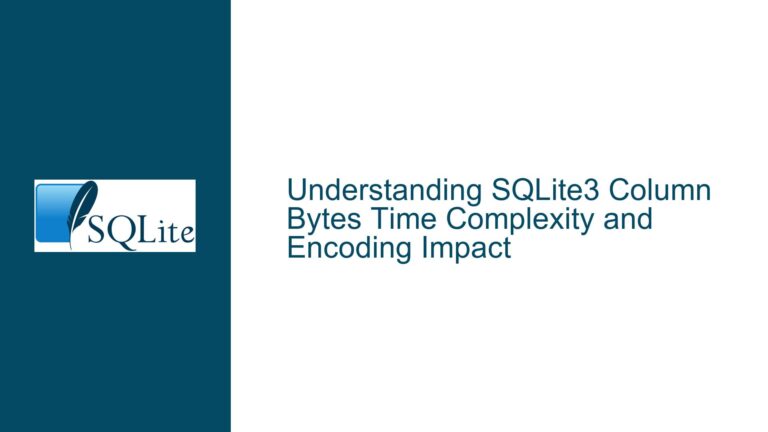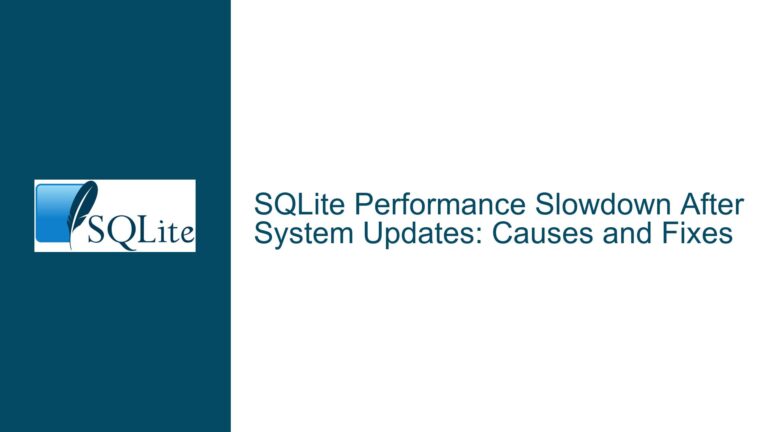Tracking Prepared Statement Finalization and Performance Metrics in SQLite
Understanding the Lifecycle and Monitoring Challenges of SQLite Prepared Statements
Issue Overview: The Need for Precise Tracking of Prepared Statement Finalization
SQLite prepared statements (sqlite3_stmt objects) are central to executing SQL commands efficiently. These statements are created using sqlite3_prepare_v2 (or similar functions) and must be explicitly finalized with sqlite3_finalize to release resources. However, the absence of a built-in mechanism to detect when a prepared statement is finalized creates two critical challenges:
- Performance Metrics Collection at Finalization: Performance counters (e.g., number of rows scanned, index usage) associated with a prepared statement are typically accessed during execution or via periodic polling. However, waiting until the moment of finalization to read these metrics ensures they reflect the statement’s complete runtime history, avoiding partial or redundant data collection.
- Pointer Lifetime Ambiguity: Developers often log or analyze prepared statements using their memory addresses (
stmt_ptr). When a statement is finalized, its memory address may be reused for new statements. Without a definitive signal that a statement is about to be destroyed, tools processing logs cannot reliably correlate metrics to specific statements, leading to misattribution (e.g., merging data from unrelated statements that coincidentally share the same memory address).
The problem is exacerbated by SQLite’s automatic statement re-preparation mechanism. When a schema change occurs (e.g., ALTER TABLE, DROP INDEX), SQLite invalidates existing prepared statements associated with the modified schema. Affected statements are automatically re-prepared when re-executed, but the original statement pointers are not immediately finalized. This creates a race condition: performance counters tied to the original statement may become invalid or outdated before finalization, complicating metrics aggregation.
For example, consider a long-running analytics tool that aggregates query performance data by stmt_ptr. If a schema change triggers re-preparation, the original statement may linger in memory (unfinalized) while the re-prepared statement begins execution. The tool might incorrectly attribute metrics from the new statement to the old stmt_ptr, skewing results.
Root Causes: Why Existing Mechanisms Fail to Address Finalization Tracking
1. Lack of Finalization-Specific Trace Events in SQLite’s Tracing API
SQLite provides the sqlite3_trace_v2 function, which allows developers to register callbacks for events like statement execution (SQLITE_TRACE_STMT) or profile timing (SQLITE_TRACE_PROFILE). However, no event exists for statement finalization (SQLITE_TRACE_FINALIZE). This gap forces developers to infer finalization indirectly:
- Manual Tracking: Applications can maintain a registry of active
sqlite3_stmtpointers, removing entries whensqlite3_finalizeis called. However, this approach is error-prone if third-party libraries or complex control flows obscure finalization calls. - Heuristic-Based Garbage Collection: Tools might assume unfinalized statements are “dead” after a timeout, but this risks prematurely discarding valid statements or retaining garbage.
2. Pointer Reuse and Schema-Driven Re-Preparation
SQLite’s memory manager may reuse the address of a finalized statement for a new sqlite3_stmt object. Without a finalization event, there is no way to signal that a stmt_ptr is about to become invalid. This leads to false associations in log analysis, where metrics from a new statement are grouped under an old pointer.
Schema changes introduce further complexity. When a statement is invalidated due to a schema change, SQLite internally marks it as “expired.” Subsequent executions trigger automatic re-preparation, but the original statement remains in memory until explicitly finalized. Performance counters tied to the expired statement are not reset, creating a mismatch between the statement’s logical lifecycle (invalidated) and its physical lifecycle (unfinalized).
Resolving Finalization Tracking and Metrics Collection Issues
1. Workarounds Using Existing SQLite Features
Manual Finalization Tracking with Weak Pointers
Wrap sqlite3_finalize in a custom function that logs the stmt_ptr before calling the native finalization:
typedef void (*sqlite3_finalize_hook)(sqlite3_stmt*);
sqlite3_finalize_hook g_finalize_hook = nullptr;
int custom_finalize(sqlite3_stmt* stmt) {
if (g_finalize_hook) g_finalize_hook(stmt);
return sqlite3_finalize(stmt);
}
This approach requires overriding all finalization calls in the codebase, which may not be feasible if third-party libraries manage statements.
Leveraging SQLITE_TRACE_STMT with Registry Cleanup
Use the SQLITE_TRACE_STMT event to track statement creation and infer finalization:
std::unordered_set<sqlite3_stmt*> active_statements;
void trace_callback(unsigned mask, void* ctx, void* p, void* x) {
if (mask == SQLITE_TRACE_STMT) {
sqlite3_stmt* stmt = static_cast<sqlite3_stmt*>(p);
if (sqlite3_stmt_status(stmt, SQLITE_STMTSTATUS_RUN, 0) == 0) {
// New statement detected
active_statements.insert(stmt);
}
}
}
// Periodically scan for finalized statements (not recommended)
void garbage_collect() {
auto it = active_statements.begin();
while (it != active_statements.end()) {
if (/* heuristic indicates stmt is finalized */) {
it = active_statements.erase(it);
} else {
++it;
}
}
}
This method is unreliable and computationally expensive, as it requires guessing when statements are finalized.
2. Modifying SQLite to Add SQLITE_TRACE_FINALIZE
For scenarios requiring high reliability, patching SQLite to emit a finalization trace event is the most robust solution. The modification involves:
- Extending the
sqlite3_trace_v2Mask: Define a new event codeSQLITE_TRACE_FINALIZE(e.g.,0x10). - Instrumenting
sqlite3_finalize: Modify the function to invoke the trace callback before deallocating the statement:
int sqlite3_finalize(sqlite3_stmt* pStmt) {
if (pStmt) {
// Trigger finalize trace
if (db->mTrace & SQLITE_TRACE_FINALIZE) {
db->traceCallback(SQLITE_TRACE_FINALIZE, db->pTraceArg, pStmt, nullptr);
}
// Proceed with finalization
/* ... existing code ... */
}
return SQLITE_OK;
}
- Updating Documentation: Clarify that the callback receives the
stmt_ptrin its final valid state, allowing tools to log or process it before it becomes invalid.
3. Mitigating Schema Change Impacts on Performance Counters
To handle automatic re-preparation:
- Monitor SQLITE_SCHEMA Errors: When a statement execution returns
SQLITE_SCHEMA, immediately finalize the old statement and discard its metrics. - Use Connection-Level Counters: Aggregate metrics at the database connection level (
sqlite3*) instead of per-statement. While less granular, this avoids misattribution due to re-preparation.
4. Best Practices for Long-Running Analysis Tools
- Avoid Raw Pointer Grouping: Instead of grouping logs by
stmt_ptr, use a composite key combiningstmt_ptrand a connection identifier or creation timestamp. - Embed Finalization Hooks in Instrumentation Libraries: Middleware managing SQLite connections (e.g., ORMs) should expose finalization events to downstream analytics tools.
This guide provides actionable strategies for addressing the absence of SQLITE_TRACE_FINALIZE, from workarounds to core SQLite modifications. Developers must weigh trade-offs between reliability, performance, and implementation complexity based on their specific use case.





